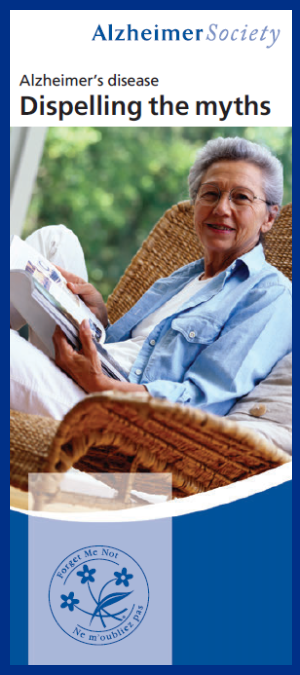Myths and realities of dementia
There are many myths and misconceptions about Alzheimer's disease and dementia: what it is, who gets it, and how it affects the people who have it. These myths stand in the way of understanding the condition and helping people affected by dementia.

Why dispelling the myths around dementia is important
The sooner we dispel the myths about dementia, the better we’ll be able to support people affected by the condition.
You can help dispel harmful myths by:
Age and assumptions
Myth: Dementia only affects older people.
Reality: Dementia can affect younger people, too.
While people over 65 are most likely to get dementia, it can affect younger people, too, even children. When this happens, it's known as young onset dementia.
Learn more about young onset dementia.
Myth: Dementia is just a part of getting older. So when I become old, I'll get it too.
Reality: Dementia is not a natural part of aging.
Most people do not develop dementia as they age. While we are not sure what exactly causes dementia, we know that certain risk factors and medical conditions (such as diabetes and stroke) can increase the risk of dementia.
Learn more about the differences between normal aging and dementia.
Some risk factors for dementia are modifiable, which means they can be changed. Just like for other conditions, if we take steps to manage our risk, then we can reduce our chances of getting dementia.
Learn more about the risk factors for dementia.
Myth: I'm experiencing memory loss. That means I have dementia.
Reality: Memory loss can be a natural part of aging. It doesn't always mean that you have dementia.
People naturally forget things from time to time. If your memory loss is severe enough that it's affecting your day-to-day abilities and your quality of life, talk to your doctor or a qualified health-care provider as soon as possible.
Learn more about getting a diagnosis.
Memory loss isn't the only sign of dementia. Many forms of dementia do not have memory loss as their first symptom. If you're experiencing any unexplained changes in mood, behaviour or ability, talk to your doctor.
Learn the 10 warning signs of dementia.
Myth: People with dementia can't understand what's going on around them.
Reality: Each person's experience with dementia is different. No one should make any assumptions about a person with dementia's level of understanding without engaging with them first.
All people living with dementia have the right to be treated with respect. Yet as soon as they get diagnosed, people living with dementia experience unfair and negative assumptions about their abilities.
Learn more about stigma against dementia.
A person living in the early stages of dementia only has mild impairment due to symptoms. They can take care of themselves, make decisions for themselves and often do not need assistance. If you think they need help, it's respectful to ask first rather than assume.
Learn more about being dementia-friendly.
While a person living in the later stages of dementia may not always be able to communicate with you directly, they can still recognize and understand the feelings behind your actions and words. It's important to try to reach the person through all the senses, such as by touch or listening to music.
Learn more about communicating with people living with dementia.
What causes dementia
Myth: Because someone in my family has dementia, I am definitely going to get it too.
Reality: For most people, family genetics do not cause dementia.
While genetics do play a role in the development of some forms of dementia, the majority of people living with dementia do not have a strong, known genetic link. For example, less than 5% of all people living with Alzheimer’s disease inherited it through a family member.
Learn more about genetic testing and Alzheimer's disease.
Myth: Smoking causes dementia.
Reality: Smoking does not cause dementia by itself, but it is one of the major risk factors for dementia.
While not everyone who smokes will get dementia, smoking can increase the risk of dementia, according to a report from the medical journal The Lancet.
The good news is that smoking is a risk factor you can change, and quitting smoking will reduce the risk of dementia.
Learn more about risk factors you can change.
Myth: Aluminum causes dementia.
Reality: There's no convincing evidence that shows aluminum causes dementia.
Current research provides no convincing evidence that exposure to trace elements of aluminum is connected to the development of dementia.
Prevention and treatment
Myth: We have a cure for dementia.
Reality: Right now, there is no cure for irreversible types of dementia. But that doesn't mean there will never be a cure.
Each irreversible type of dementia*, including Alzheimer’s disease, remains without a cure. However, receiving medications, support and care early on can help manage symptoms and improve quality of life.
And because dementia is not a natural part of aging, that means a cure is possible. As you read this, researchers in Canada and around the world are hard at work learning more about dementia.
If we can understand more about dementia, and figure out what exactly causes it, then we can work on better treatments and a cure. We're not there yet – but one day we will be.
Find out what the current research is telling us about dementia.
*Note: “Irreversible types of dementia” refers to types of dementia whose symptoms cannot be reversed. Examples of irreversible types of dementia are Alzheimer’s disease and frontotemporal dementia.
Myth: Dementia can be prevented.
Reality: While there are medications that can manage the symptoms, there is no effective treatment that fully prevents dementia or stops its progression.
While there are no treatments that can prevent the irreversible forms of dementia, there are four approved medications that can help manage the symptoms of Alzheimer’s disease and some other dementias.
Learn more about the medications approved to treat dementia.
There is also a growing amount of evidence that making brain-healthy choices can reduce the risk. These choices include:
- Being physically active
- Being socially active
- Challenging your brain
- Eating healthily
- Making conscious and safe choices
- Managing stress and other health conditions
Learn more about reducing your risk of dementia.
Myth: Certain vitamins, supplements and memory boosters can prevent and treat dementia.
Reality: While these treatments may help you manage stress and reduce some symptoms, ultimately they will not stop or reverse cognitive decline brought on by dementia.
Many studies have tested the effectiveness of products such as coconut oil, herbal remedies and dietary supplements. However, studies linking these substances to effective prevention and treatment of dementia have been inconclusive.
Learn more about alternative treatments for dementia.
Myth: Marijuana can prevent and treat dementia.
Reality: While there is ongoing promising research on the effects of cannabis, there is currently no evidence that cannabis is useful for the treatment or prevention of dementia.
More research is being done to investigate possible uses of cannabis, including how it may help manage symptoms in people living with dementia.
Living with dementia
Myth: If I’m diagnosed with dementia, it means my life is over.
Reality: You can live with dementia and, at the same time, live meaningfully and actively for many years.
Many people diagnosed with dementia have meaningful, active lives for a number of years. They have a sense of purpose and do not feel their lives are over. How do people live well with dementia?
- Research indicates that making brain-healthy choices can help slow the progression of dementia. Examples of these choices include eating a healthy diet, exercising regularly, staying socially connected and challenging your brain.
- Earlier diagnosis and medications also help. While medications may not work well for everyone, they are most effective in the early stages. That's why early diagnosis is important.
- It's also important that people living with dementia can access programs and services that support their quality of life.
- Some people living with dementia enjoy public speaking and advocacy to raise awareness and reduce stigma against dementia.
Learn more about living well with dementia.
Myth: All people with dementia experience distressing changes in their behaviour (such as aggression).
Reality: Dementia affects each person differently. Not all people living with dementia will have changes in behaviour.
Not everyone living with dementia will have behaviour changes. However, some people living with dementia may experience changes in their behaviour, mood or personality due to changes in the brain. For the person living with dementia, these changes are often due to challenges understanding the world around them, memory changes, confusion and increased difficulty with communication, which makes it difficult for the person to express their needs. To better support someone living with dementia who is experiencing changes in their behaviour, learn about dementia and how to communicate with the person and provide a safe environment.
Read this information in a downloadable PDF
Looking for a downloadable PDF version of this information?
Download our brochure about dispelling the myths on Alzheimer's disease, the most common form of dementia.
Also available to download in a print-friendly format (PDF).

